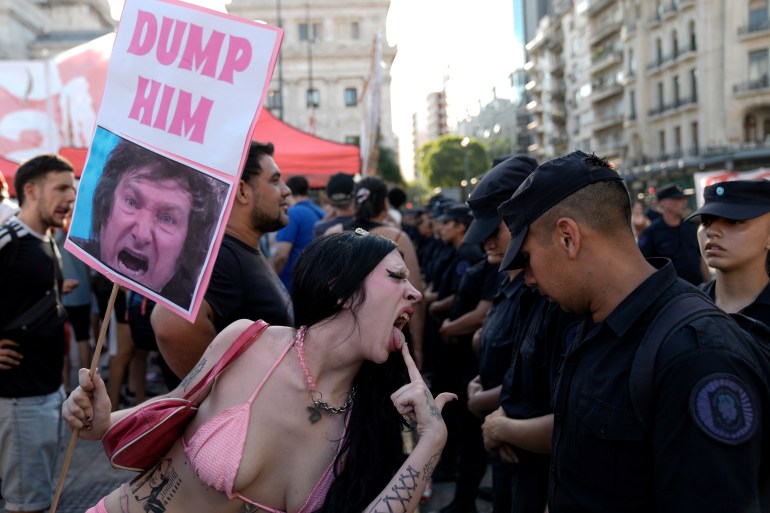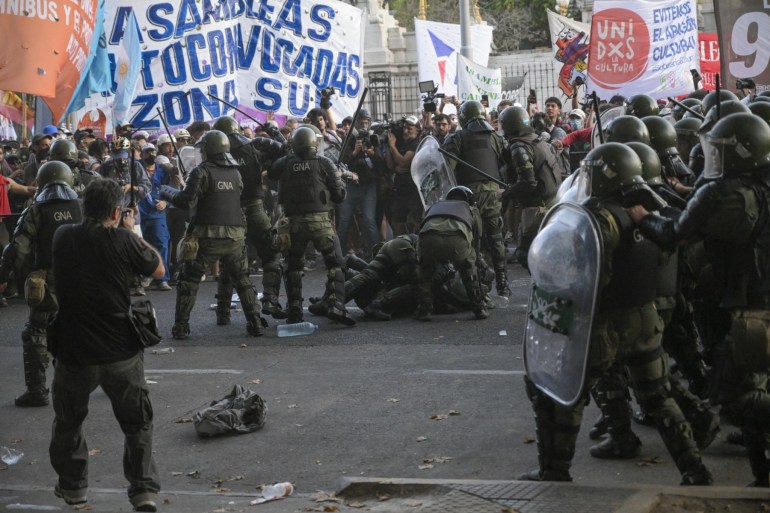Disillusioned by decades of financial crises, Argentinian voters surprised pollsters by electing Javier Milei as president last November. While the far-right libertarian, who promised painful shock therapy to fix the country’s ailing economy and has now been in office for 100 days, did achieve some early successes, he has struggled to implement the most far-reaching parts of his reforms.
Amid growing social tensions, the president is struggling to overcome hostile lawmakers to enact his radical austerity agenda.
“I want you to understand that Argentina is in a critical situation,” Milei said hours after being elected. “The changes our country needs are drastic. There is no room for gradualism.”
When Milei assumed office, inflation was hovering at 143 percent, poverty tallied at 40 percent and the government owed $110bn to external creditors. In part, his election was a rebuke of the ruling Peronist establishment, which had dominated politics in Argentina since 1983.
Days after his inauguration, the former TV pundit began implementing his radical plan – he devalued the peso by 50 percent, slashed state subsidies for fuel and reduced the number of ministries by half.
Though Milei has rowed back on campaign pledges to dollarise the economy and abolish the central bank, his initial moves have been welcomed by the International Monetary Fund (IMF). In January, the IMF signalled its support by disbursing $4.7bn in loans.
Argentina’s tilt to the hard right has also buoyed financial markets. Immediately after Milei’s election, Argentina’s international bonds maturing in 2041 rallied by seven percent. Rising bond prices typically reflect growing investor confidence in a country’s economic policies.
Critics, meanwhile, fear that President Milei’s broad-based austerity programme could trigger mass unemployment and tip the economy into an unpredictable and potentially turbulent future.
Emergency decree
On December 20, Milei issued an emergency decree aimed at amplifying his deregulation push from the previous week.
The mandate – which can only be used under “exceptional circumstances” – allows Milei to bypass Congress, where his party La Libertad Avanza holds just 38 of 257 seats (and seven of 72 seats in the Senate). As in the United States, legislation proceeds from the lower to the upper house.
The decree altered, or scrapped, 366 laws with the aim of privatising the country’s state-owned enterprises including an airline, media companies and the energy group YPF. The measures also pared back regulations on healthcare, housing and land ownership.
Elsewhere, the edict stripped away workers’ rights by, among other things, reducing maternity leave pay and severance compensation. It also allowed companies to dismiss workers participating in strike action.

The decree immediately sparked protests, and following an appeal from Argentina’s umbrella union, the General Confederation of Labour (CGT), a court suspended Milei’s worker reforms. On January 30, the court deemed Milei’s reforms “unconstitutional”.
“That was a loss for the government,” said Matias Vernengo, a former official at the Central Bank of Argentina. “Labour reform is a big issue for Milei.”
Then, on March 14, Argentina’s Senate voted to reject the emergency decree in a further blow to the president.
Many centrist lawmakers argued that Milei must present his deregulation reforms as bills in Congress. His plan’s survival now depends on negotiations with opposition representatives in Argentina’s lower house.
“I don’t think he’ll be able to convince Congress,” Vernengo said. “This will be problematic, as the public’s tolerance will depend on whether Milei can generate growth. That is the oxygen he needs to keep going. Having policies held up by lawmakers doesn’t look good.”
Reform bill
Days after he announced his emergency decree, Milei circulated a reform bill, known as the omnibus, to Congress on December 22. It proposed changes to four key areas of policy – tax, penal, electoral and the party system – which presidents cannot affect by decree.
In addition to spending cuts aimed at eliminating the deficit by the end of 2024, the bill sought to scrap proportional representation in Congress. It also proposed to cede legislative power to the president in areas such as energy and fiscal policy until 2025.
In opposition to what some viewed as power-grabbing measures, Argentinian workers, coordinated by the CGT, went on a general strike. Coming just 45 days after the president took office, it was the fastest strike action of its kind in Argentine history. Following days of tense debate, Congress approved a watered-down version of the omnibus bill on February 2, paving the way for a decisive vote in the Senate, where the legislation was set to undergo further changes.
Negotiations finally proved unsuccessful, however, after key measures were rejected by the ruling coalition. An embattled Milei went so far as to withdraw the bill on February 6, nullifying the vote from days earlier.
Rather than see his bill “shredded”, Milei told the Financial Times, he has chosen to wait until mid-term elections in late 2025, when he will try again with a new package. In the meantime, “there are other reforms which we can do by decree [without Congress]”, he said.
According to Graham Stock, an emerging markets sovereign debt strategist at BlueBay Asset Management, Milei looks set to rely on executive powers – as opposed to congressional consent – to try and implement his radical austerity plan.
“The executive has a lot of control over the expenditure side of the budget, including on discretionary transfers to the provinces, which have already been cut to force the governors to the negotiating table,” he said.

Milei blamed regional governors for not backing his omnibus bill. In turn, he hit them with austerity, cutting a subsidy that provincial leaders use to keep public transportation costs down.
Stock told Al Jazeera that Milei “is now trying a different route to congressional majority”, by engaging in a fiscal tug-of-war with Argentina’s governors, who wield considerable influence over state representatives.
Still, questions remain over Milei’s ability to form an awkward pact with the country’s governors, many of whom are loyal Peronists. For Stock, “there is a path to a successful stabilisation and recovery of the Argentine economy, but it’s a narrow one”.
Analysts were caught by surprise after the government eked out Argentina’s first budget surplus in 12 years at the start of 2024. That was achieved by reducing payments to provinces, freezing budgets and not matching social spending fully for inflation.
Waiting game
According to Eduardo Barcesat, a professor of law at the University of Buenos Aires, Milei’s choice to attack the governors could backfire. “By taking a confrontational stance with governors, he’s made his position even weaker in Congress, especially with centrist legislators.”
Over the coming months, “the president will hope to galvanise support around his policies”, Barcesat said. “If shock therapy takes off and delivers results, especially around inflation, he believes he can increase support,” he said. “So far, this hasn’t been remotely achieved.”
Inflation rocketed to 276 percent in February, principally due to recent peso depreciations. Elsewhere, the poverty rate hit 57.4 percent in January, its highest in 20 years. Rising tensions among workers and unions have provoked high numbers of strikes and protests in recent weeks.
For Matias Vernengo, the former central bank official, “Milei is taking a huge gamble with the Argentinian people. If he doesn’t deliver results soon, I think that protests will start to turn violent. Things could get ugly.”









